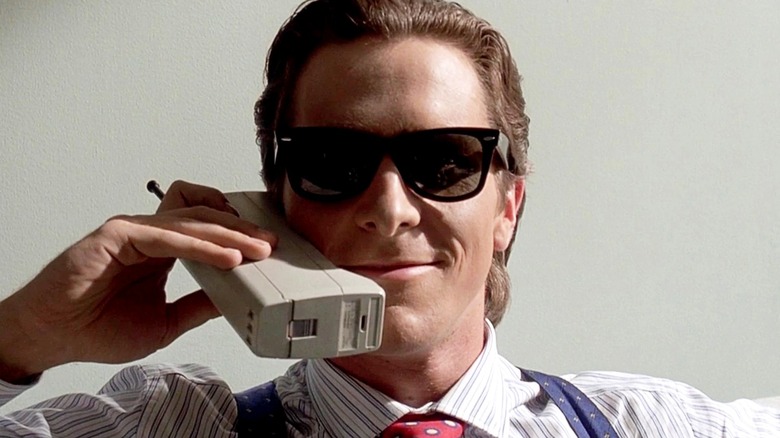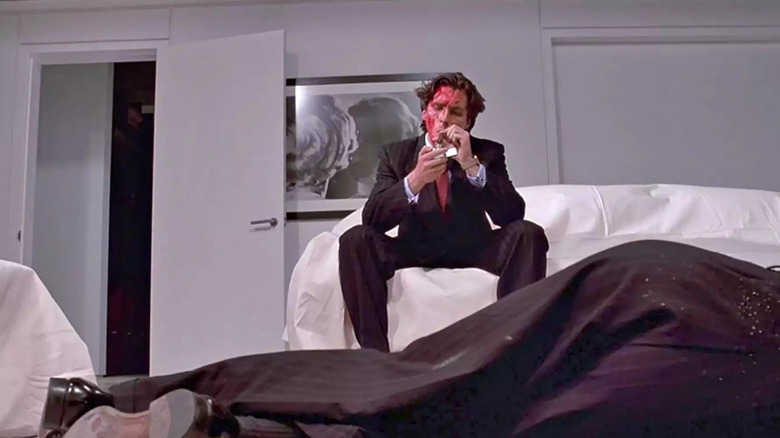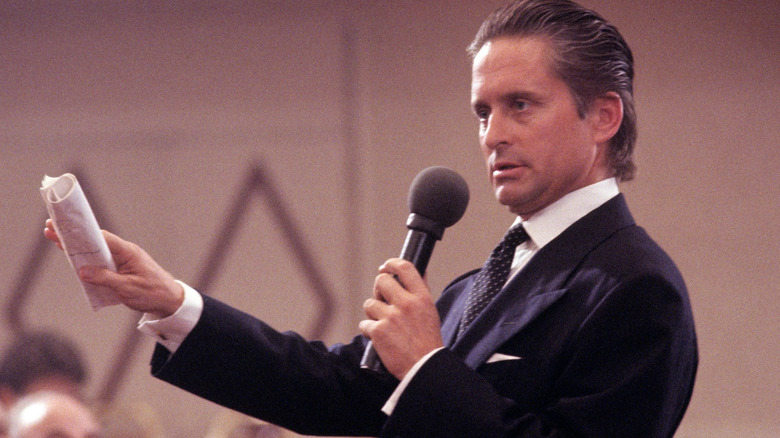
What's Christian Bale's best performance? For me, it's still the American psycho himself, Patrick Bateman. Why does his acting in the 2000 horror-thriller stand above the rest of his filmography? Because Bale acted like he was in a comedy. Director Mary Harron said that she ultimately decided to cast Bale because she "sort of had the feeling a lot of the other actors kind of thought Bateman was cool. And he didn't." Together, she and Bale made a pitch-black, gut-busting comedy.
Bale's Patrick, even when's he not violent, is too phony to be charming. It's possible that Bateman is only imagining being a serial killer, but he's definitely a psychopath. His preppy accent is layered on top of a dull monotone and too-slow staccato intonations. Whether rattling off praise for his favorite musicians or championing political causes, it all sounds rehearsed because Bateman doesn't know what sincerity sounds like. When he laughs, it's a wheeze forced through his windpipe. His mask of sanity is adorned with a cheesy grin and dead eyes (modeled on Tom Cruise). Whether he's swaying his hips to "Hip to be Square" or wielding a shalt-shaker, Bateman doesn't seem entirely comfortable in a human body, even one as perfectly toned as his.
Everything about Patrick Bateman is so transparently fake, it becomes hilarious. Then come the moments the mask slips. He brandishes axes and chainsaws, screaming with rage while covered in others' blood, and you're horrified with yourself for laughing earlier.
However, while Bale didn't see Patrick Bateman as cool, the actor claims that some viewers of the movie did. Specifically, the exact type of people who Bateman's character was satirizing.
Die Yuppie Scum

Bale recently sat down with GQ to discuss some of his "Most Iconic Characters." Patrick Bateman was, of course, one of them, and Bale shared an encounter he had with real Wall Street traders and their "worrying" reaction to Bateman's representation of their profession:
"I visited, you know, all different levels of people at Wall Street. But the guys on the trading floor, when I arrived there before making the film, I got there and a bunch of them, they were going, 'Ahh Patrick Bateman,' and patting me on the back and going, 'oh yeah, we love him!' And I was like, 'Yeah, ironically, right?' And they were like, 'What do you mean?'"
It's important to understand what "American Psycho" is satirizing -- namely, the Reagan '80s and the yuppie culture they bred. Those in Bateman's social circle have no meaning in their lives, so they fill the void with money. All they have to show for their wealth is consumption of things that signify that wealth, such as suits, watches, business cards, and restaurant reservations. The yuppies are so shallow, so fake, so soulless, that they don't notice or care about the psycho in their midst.
Bale, for his part, brushed off these reactions with good humor:
"But you know, clearly, look, it's a satire on Capitalism in the '80s, and as such is so bloody far-fetched and ridiculous that, you know, to me, I can't help but think it's hilarious."
Indeed, there's a reason that Bateman is an American psycho — his emptiness, sadism, and loathing (of himself and everyone else) are a product of American culture. Before he stabs a homeless man (Reg E. Cathey) to death, he gives the man some advice: "Get a g*damn job." All that's missing is for Bateman to mention bootstraps.
Not The First Time

This isn't the first time that Wall Street turned a villain into their personal icon. Oliver Stone's 1987 "Wall Street" gave the world Gordon Gekko (Michael Douglas), a product of the same time and place as Bateman. Gekko advocates Darwinian hyper-capitalism, declaring, "greed is good." He also proudly admits that stockbrokers like himself create nothing of value, yet he has his hands on the economic levers all the same.
If these traits weren't enough hints that the movie wants you to dislike Gekko, he gets sent to prison for insider trading. Yet, Gekko became an icon for real life finance workers, who find his bottomless drive and hunger admirable instead of sociopathic. Like Bale, Douglas was surprised and discomfited to find his character being idolized by the denizens of Wall Street:
"People love Gordon Gekko. You know, if I get one more drunken Wall Street guy coming up, 'You're the man, you know, you're the man.' And I said, 'Hey, I was the villain. Remember? I went to jail.'"
Speaking of Bateman, The Financial Times recently published a piece digging into the character's fashion choices, comparing them both to real brokers of that era and what Wall Street is wearing in the 2020s. The raincoat Bateman wears when butchering Paul Allen (Jared Leto) doesn't get a mention.
"American Psycho" makes it clear that, even with the sheen of wealth and class gilded on, Bateman's existence is a miserable one. Unfortunately, the people who that should've spoken to didn't quite grasp the message. Even the broadest satire can be too subtle.
Read this next: Horror Movies That Make Us Root For The Villain
The post Christian Bale Got Some 'Worrying' American Psycho Reactions From Real-Life Wall Street Traders appeared first on /Film.
0 Comments